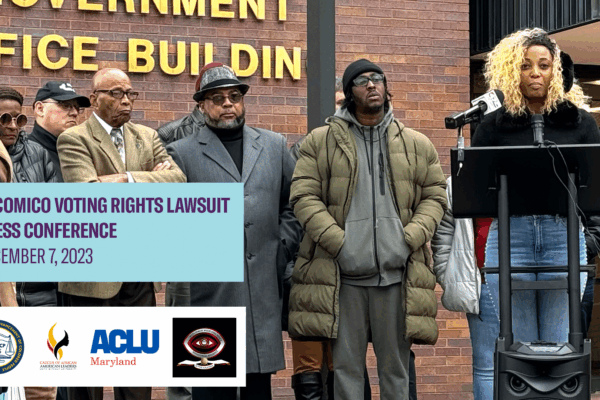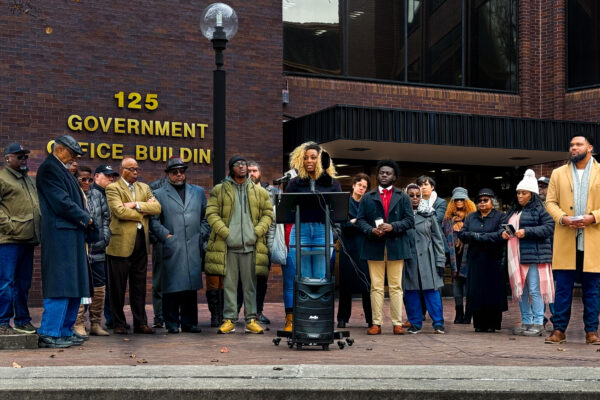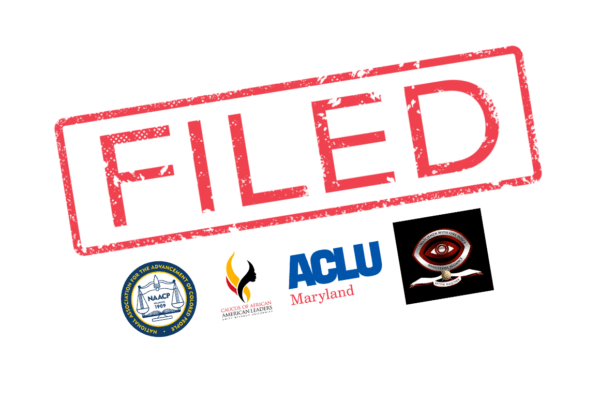Salisbury, MD – Challenging as racially discriminatory and unlawful the at-large component of the election system for the Wicomico County Council and Board of Education, which dilute the votes of Black residents and limit fair representation, several Black voters and local organizations have joined to file suit today in federal district court in Baltimore under the landmark Voting Rights Act of 1965. The action comes against the backdrop of a long history and legacy of racial discrimination and oppression in Wicomico County and across Maryland’s Eastern Shore. The Wicomico County Branch of the NAACP, the Caucus of African American Leaders, and the Watchmen With One Voice Ministerial Alliance, join with individual voters Dr. Eddie Boyd, Luc Angelot, Amber Green, and Monica Brooks in charging that the County’s resistance to enacting fair election plans has denied the right of Black residents to vote free from discrimination and to fair representation in their government for far too long. Together, they ask the court to declare the current election system unlawful, and require the County and School Board to create a fair system that complies with the Voting Rights Act.
Dr. Eddie Boyd, individual plaintiff and advocate from Wicomico County, said: “We have a broken system that needs to be fixed. The at-large component of the election systems for the Wicomico County Council and the Board of Education, together with the polarization of voting in the county, essentially reserves the at-large seats for whites only. This is not speculation, as no African American has been elected at-large since the creation of the system. We need a new system that is equitable to all the parties involved.”
Tracing the history of race discrimination in Wicomico County and its impacts on Black residents entrenched through the County’s use of a discriminatory election system, the lawsuit alleges:
Wicomico County has a long and disgraceful history of discrimination against Black residents, evident in pervasive segregation, overt racial polarization throughout the community, and unequal access to education, employment, housing, and government services based on race. Against the backdrop of this history and its continuing legacy, the Defendants’ election practices and structure work in concert with patterns of racial polarization in voting to empower Wicomico’s white majority to override and dilute the influence of Black voters, suppress Black candidacies, and deny Black residents equal opportunity to elect their chosen representatives. Defendants’ longstanding maintenance of this racially dilutive system has denied Plaintiffs their rights to vote free from discrimination and to fair representation in their government over the course of decades.
Amber Green, individual plaintiff and advocate from Wicomico County, said: “This work is so important for this area because the young people feel so disempowered, like they don’t have a say, don’t have a voice, and they feel that way because the adults in their lives feel that. It’s a generational trauma born of not having your voice matter. Young people are dealing with so much, an increase in youth incarceration, a mental health crisis, and homelessness. It makes sense for them to be in the forefront of making community decisions that impact them. But the current system does not encourage them to register and vote. We need to change that.”
Nearly 30 percent of Wicomico County’s population is Black, and over 40 percent is Black, Indigenous, People of Color, while students attending Wicomico County public schools are 63 percent BIPOC. Yet the County and its School System are governed almost exclusively by white people. White officials hold all but a single seat among the seven on both the County Council and School Board, with the lone Black member on each elected from the single majority-Black district. Likewise, all state legislators representing Wicomico County are white, with the sole exception of the state delegate elected from a majority-Black district ordered into effect by Maryland’s federal court through voting rights litigation. Overall, the County Executive, School Superintendent, State’s Attorney, Sheriff, Register of Wills, Court Clerk, Judges of the Circuit, District and Orphan’s Courts all are white.
Monica Brooks, president of the Wicomico County Branch of the NAACP, said: “This is not a new struggle, but a new front on an old one that has been going on since the reconstruction era. There has rarely been a time in our country’s history where there hasn’t been some form of racist disenfranchisement or gerrymandering, and Wicomico is no exception… unless we can use this moment to prove otherwise… unless we can create a 'new reconstruction'."
W.E.B Du Bois once said, “The power of the ballot we need in sheer defense, else what shall save us from a second slavery?”
Rev. Dr. Lewis Watson, president of the Watchmen with One Voice Ministerial Alliance, said: “We the Watchmen with One Voice Ministerial Alliance find ourselves many times speaking for the voiceless. We are a group of ecumenical pastors representing our community and oftentimes we see policies that put Black and Brown people at a disadvantage. The current system, where minorities are represented by only one out of seven seats, will always put us at a disadvantage. Equality leaves the door open to everybody to come in. That’s why we need Wicomico County leaders to be fair, so that we can all be at the table.”
Carl O. Snowden, convenor of the Caucus of African American Leaders, said: “This voting rights lawsuit will make the Wicomico County government a more inclusive and representative government. It is our goal to make Wicomico County a better place not a bitter one.”
Since adoption of the County’s hybrid election structure in 1990 as part of voting rights litigation brought by the U.S. Department of Justice, no Black or other BIPOC candidate has ever won election to either of the at-large seats nor to any district seat except the single district with a majority-minority population, despite several attempts and the increased presence of BIPOC residents in the County. In this way, Wicomico’s 5-2 system marginalizes the Black electorate and enhances the white electorate to ensure that six officials for each body are elected by a white majority of voters, and only one by a Black majority. Through this unlawful, partial at-large system, the County is able to perpetuate a long legacy of discrimination.
Deborah Jeon, legal director for the ACLU of Maryland, said: “Black voters in Wicomico County have waited far too long for election fairness in this community, and today declare their unwillingness to wait any longer. This lawsuit has been decades in the making, but now, both the County Council and School Board must reform their discriminatory election systems to comply with the Voting Rights Act and to afford Black voters equal opportunities to elect their candidates of choice. They can do so voluntarily, or await a court order. But we are determined, at long last, to see fair representation for Wicomico’s Black residents and families.”
The Plaintiffs are represented by John Freedman, Jonathan Stern, Michael Mazzulo, Michael Mischke and Anora Wang of Arnold & Porter, as well as Deborah Jeon and Nick Taichi Steiner from the ACLU of Maryland.
Related Content

Wicomico County Voting Rights Press Conference Highlights

Racial reckoning comes to Maryland’s Eastern Shore

ACLU of Maryland Statement on Wicomico County Council Vote to Enter 287(g) Agreement with Immigration and Customs Enforcement
Stay Informed
Sign up to be the first to hear about how to take action.
By completing this form, I agree to receive occasional emails per the terms of the ACLU’s privacy statement.
By completing this form, I agree to receive occasional emails per the terms of the ACLU’s privacy statement.

